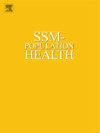Physician-patient sex concordance and patient outcomes: Evidence from China
IF 3.1
2区 医学
Q1 PUBLIC, ENVIRONMENTAL & OCCUPATIONAL HEALTH
引用次数: 0
Abstract
The growing body of research on the effects of physician-patient sex concordance on healthcare delivery across various medical settings has yielded highly heterogeneous results, with limited evidence from low- and middle-income countries (LMICs). This study aims to examine the impact of physician-patient sex concordance on both the quality of care (treatment outcomes and 30-day readmission rates) and medical expenditure (total expenditure and specific fee categories) among hospitalized patients with acute myocardial infarctions (AMI) in China. Using hospital administrative data (2018–2022) from a tertiary general hospital in Eastern China, we focus on the patients with a primary discharge diagnosis of AMI to achieve the random matching between physicians and patients (n = 1299). Our findings indicate that 70 % of AMI patients were treated by surgeons of the same sex. The patients in the physician-patient sex concordance group incurred significantly higher hospitalized expenditure, primarily in medication and surgery expenditure, with no significant increase in diagnostic expenditure. Physician-patient sex concordance was associated with an average increase of 2.3 days of hospitalization and a 4.37 percentage point increase in the copayment rate. However, no significant improvement in quality of care was observed. These findings provide a foundation for future research on the underlying mechanisms driving disparities in healthcare delivery due to physician-patient sex concordance, which is critical for the deep understanding of gender equity in health care.
医患性别一致性和患者结局:来自中国的证据
越来越多的关于医患性别一致性对各种医疗机构医疗服务的影响的研究得出了高度不一致的结果,来自低收入和中等收入国家(LMICs)的证据有限。本研究旨在探讨医患性别一致性对中国急性心肌梗死(AMI)住院患者的护理质量(治疗结果和30天再入院率)和医疗支出(总支出和特定费用类别)的影响。利用华东地区某三级综合医院的医院管理数据(2018-2022年),以初步出院诊断为AMI的患者为研究对象,实现医患随机匹配(n = 1299)。我们的研究结果表明,70%的AMI患者是由同性外科医生治疗的。医患性别一致组患者住院费用显著增高,主要表现在药物和手术费用上,诊断费用无显著增高。医患性别一致性与住院时间平均增加2.3天和共同支付率增加4.37个百分点有关。然而,没有观察到护理质量的显著改善。这些发现为进一步研究医患性别一致性导致医疗服务差异的潜在机制提供了基础,这对于深入理解医疗保健中的性别平等至关重要。
本文章由计算机程序翻译,如有差异,请以英文原文为准。
求助全文
约1分钟内获得全文
求助全文
来源期刊

Ssm-Population Health
PUBLIC, ENVIRONMENTAL & OCCUPATIONAL HEALTH-
CiteScore
6.50
自引率
2.10%
发文量
298
审稿时长
101 days
期刊介绍:
SSM - Population Health. The new online only, open access, peer reviewed journal in all areas relating Social Science research to population health. SSM - Population Health shares the same Editors-in Chief and general approach to manuscripts as its sister journal, Social Science & Medicine. The journal takes a broad approach to the field especially welcoming interdisciplinary papers from across the Social Sciences and allied areas. SSM - Population Health offers an alternative outlet for work which might not be considered, or is classed as ''out of scope'' elsewhere, and prioritizes fast peer review and publication to the benefit of authors and readers. The journal welcomes all types of paper from traditional primary research articles, replication studies, short communications, methodological studies, instrument validation, opinion pieces, literature reviews, etc. SSM - Population Health also offers the opportunity to publish special issues or sections to reflect current interest and research in topical or developing areas. The journal fully supports authors wanting to present their research in an innovative fashion though the use of multimedia formats.
 求助内容:
求助内容: 应助结果提醒方式:
应助结果提醒方式:


